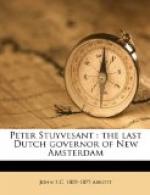“was carried out to an extent of which most persons are ignorant. On the Van Rensselaer manor, there were at one time, several thousand tenants, and their gathering was like that of the Scottish clans. When a member of the family died they came down to Albany to do honor at the funeral, and many were the hogsheads of good ale which were broached for them. They looked up to the Patroon with a reverence which was still lingering in the writer’s early day, notwithstanding the inroads of democracy. And before the Revolution this feeling was shared by the whole country. When it was announced, in New York, a century ago, that the Patroon was coming down from Albany by land, the day he was expected to reach the city, crowds turned out to see him enter in his coach and four.”
The aristocratic Dutchmen cherished a great contempt for the democratic Puritans of New England. One of the distinguished members of a colonial family in New York, who died in the year 1740, inserted the following clause in his will:
“It is my wish that my son may have the best education that is to be had in England or America. But my express will and directions are, that he never be sent for that purpose, to the Connecticut colonies, lest he should imbibe in his youth, that low craft and cunning, so incidental to the people of that country, which is so interwoven in their constitutions, that all their acts cannot disguise it from the world; though many of them, under the sanctified garb of religion, have endeavored to impose themselves on the world as honest men.”
Usually once in a year the residents in their imposing manorial homes repaired, from their rural retreats, to New York to make their annual purchases. After the country passed into the hands of the English, several men of high families came over. These all held themselves quite aloof from the masses of the people. And there was no more disposition among the commonalty to claim equality with these high-born men and dames, than there was in England for the humble farmers to deny any social distinction between themselves and the occupants of the battlemented castles which overshadowed the peasant’s lowly cot.
Lord Cornbury was of the blood royal. The dress and etiquette of courts prevailed in his spacious saloons. “About many of their old country houses,” writes Mr. Kip,
“were associations gathered often coming down from the first settlement of the country, giving them an interest which can never invest the new residences of those whom later times elevated through wealth. Such was the Van Courtland manor-house, with its wainscotted room and guest chamber; the Rensselaer manor-house, where of old had been entertained Talleyrand, and the exiled princes from Europe; the Schuyler house, so near the Saratoga battle-field, and marked by memories of that glorious event in the life of its owner; and the residence of the Livingstons, on




